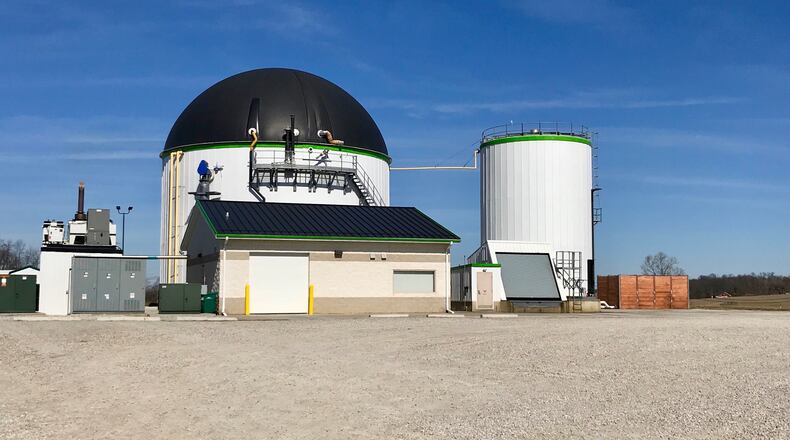Renergy creates this biogas by putting material into biodigestion tanks where it is broken down. The byproduct must be injected into the ground to apply it.
Cari Oberfield, COO of Renergy, said currently about 20% of what Renergy takes in is municipal waste. After Oct. 1, the company will only accept food waste and farm waste, like manure, she said. Oberfield says these materials would end up in a landfill if Renergy did not take them.
Oberfield said Renergy, also known as Dovetail Energy, has had a lot of questions from people living near the Bath Twp. facility.
Bath Twp. and Fairborn residents protested the operation last week. The main concerns of people who live nearby are about human waste from municipalities and how it may impact health. Fairborn and Bath Twp. residents have been pushing to have the operation shut down for years.
Bradley Martin, a Fairborn resident and organizer of the protest last week, said residents continue to be upset by the smell, the potential health hazards of living near the bio-energy farm, the potential environmental impact and the lack of transparency of the township trustees. Dovetail operates on Bath Twp. Trustee Tom Pitstick’s hog farm.
Oberfield said the questions citizens have are questions that can only be answered by the Ohio EPA and they’re ”out of Renergy’s control.” Oberfield said she hoped taking the human waste “out of the equation” would help community relations.
“We did not have support from the EPA regarding biosolids and it was negatively impacting our relationship with our community,” Oberfield said. “We want to be able to quell concerns of the neighbors, but until the EPA can answer all those questions or wants to step in, we just feel like it’s better for the community to remove that part of it.”
Oberfield said she, some other Renergy employees and neighbors who support the bio-energy operation attended the protest last week to show support for their staff.
In March, the Bath Twp. Board of Zoning Appeals ruled Renergy is not operating in accordance to their land’s agricultural zoning, but instead is operating a business more appropriate for industrial zoning. Renergy has appealed this ruling.
In September of 2019, an independent zoning inspector found Renergy was not compliant with the agricultural zoning of the land it sits on. Fayette prosecutor Jess Weade issued a cease and desist order, giving Renergy 30 days to become compliant. The bio-energy company appealed that order.
Renergy continues to operate today, despite the March zoning ruling.
The township filed a motion in July asking why Dovetail and Bath Twp. Trustee Pitstick should not be held in contempt of court, according to Bath Twp. Trustee Steve Ross.
Renergy has also stated that they are a public utility. When the zoning board ruled against Renergy, the company said it was disappointed the board didn’t “consider evidence showing that Dovetail is a public utility under Ohio law.” Oberfield maintained that the company is a renewable energy public utility and that the company is operating in accordance with the law.
Oberfield said the company will continue processing food waste and manure to provide renewable electricity to power the Pitstick farm, the utility grid and provide valuable organic fertilizer to local farmers.
Renergy has two digester facilities located in Ohio, one in Bath Twp. and one near Columbus.
About the Author



